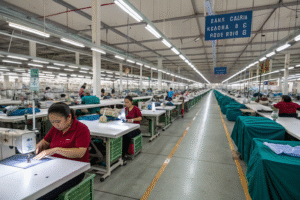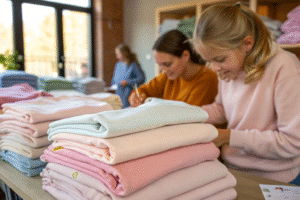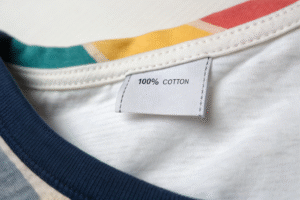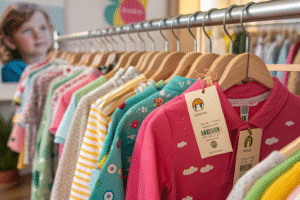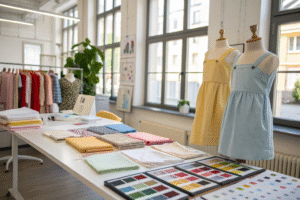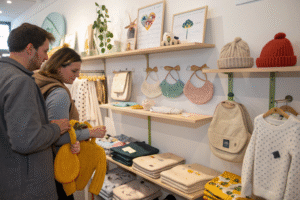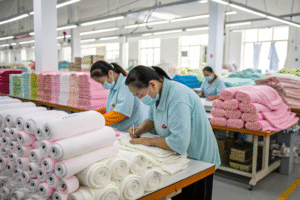Your child’s skin is sensitive, and their wardrobe shouldn’t be an experiment in chemical exposure or short-term comfort.
Organic cotton is ideal for kidswear capsules because it’s gentle on skin, durable over time, grown without harmful chemicals, and aligns with eco-conscious parenting.
When it comes to basics that get worn again and again, nothing beats the breathable softness and lasting quality of organic cotton.
Benefits of Organic Cotton for Children’s Skin
Kids wear their clothes close—so what’s touching their skin matters more than most parents realize.
Organic cotton is hypoallergenic, breathable, and free of harmful chemicals, making it ideal for babies and children with sensitive skin or allergies.

Why is organic cotton safer for kids with eczema or skin sensitivities?
Conventional cotton is often grown with pesticides and processed with harsh chemicals that remain in the fabric. These residues can trigger irritation, especially on babies’ and toddlers’ delicate skin.
Organic cotton, by contrast, is processed without toxic finishes or bleaches. That’s why many of our B2B clients in infant and toddler apparel insist on GOTS-certified organic cotton, which ensures the material is both safe and clean through every stage.
We’ve supplied capsule-ready organic onesies and tees to brands in Europe and the U.S.—many of whom market them specifically for sensitive skin. Parents respond with trust, and kids respond with comfort.
How does organic cotton help regulate body temperature and reduce discomfort?
Kids run, jump, nap, and move all day. They sweat. They spill. That means they need breathable basics that can wick moisture without clinging or overheating.
Organic cotton fibers are naturally more porous and breathable than synthetic blends. They allow airflow while absorbing moisture gently—ideal for underlayers, sleepwear, and warm-weather wear.
At Fumao Clothing, we source double-knit organic cottons with light stretch. These work well in capsule basics like tees, leggings, and rompers that need to perform across seasons.
How Organic Cotton Enhances Kidswear Durability
Organic doesn’t mean delicate—in fact, it’s stronger when done right.
When properly woven and finished, organic cotton is extremely durable, resisting pilling, tearing, and shrinkage across frequent wash and wear cycles—ideal for capsule items worn often.
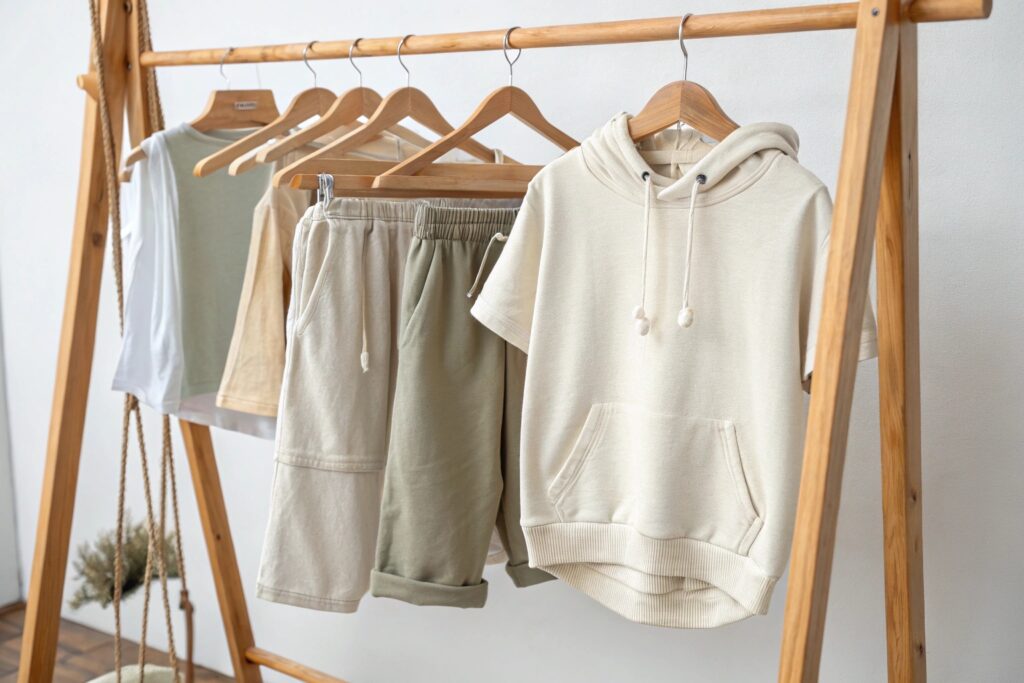
What makes organic cotton hold up better in daily wear and washing?
Unlike mass-farmed cotton, organic crops aren’t weakened by chemical treatments during growth. This preserves the fiber structure, especially when spun using ring-spun or combed methods.
We test every cotton fabric we use with a 30-wash durability cycle. Organic cotton performs just as well—often better—than its conventional counterpart. Our brushed organic jersey blend retains shape and color far longer than fast-fashion cotton.
In capsule design, where each item is worn repeatedly, this matters. A well-worn tee that still looks good on the 20th wear is a sustainable win for everyone.
How can brands ensure organic cotton garments maintain performance across growing children?
Organic cotton is versatile enough to work in both infantwear and activewear—as long as it’s engineered well.
We build capsule lines with features like:
- Pre-shrunk finishes
- Reinforced seams
- 4-way stretch ribbed collars and cuffs
- Double-stitched shoulder panels
One of our U.S. capsule brand partners uses a Fumao-developed 95% organic cotton / 5% spandex blend for all their base layers. It stretches without warping and resists neck sagging—a major issue in toddlerwear.
Durability isn’t optional in kidswear. Organic cotton, when woven for performance, exceeds expectations.
Organic vs. Conventional Cotton: What Parents Should Know
All cottons look alike—but not all cotton is created equal.
The key differences between organic and conventional cotton lie in how they’re grown, processed, and treated—with major impacts on skin health, environment, and fabric longevity.

How is organic cotton farming better for the environment and farm workers?
Conventional cotton uses about 16% of the world’s insecticides despite occupying just 2.5% of global farmland. This not only pollutes water and soil but affects the health of farming communities.
Organic cotton is grown without synthetic pesticides, uses less water, and supports biodiversity. Farmers also face lower chemical exposure risks.
We source our organic cotton from GOTS-audited farms that use crop rotation, rainwater irrigation, and natural composting to keep soil fertile. Clients who choose this material aren’t just making better clothes—they’re supporting better farming.
What toxic treatments are often found in conventional cotton kidswear?
It’s common for non-organic kidswear to contain:
- Formaldehyde (used to prevent wrinkles)
- Chlorine bleach (used to whiten fabric)
- Heavy metal dyes (used for bright colors)
- Phthalates (sometimes found in prints or appliqués)
These chemicals don’t always wash out—and they’re absorbed through skin, especially in warm or sweaty conditions.
By contrast, GOTS-certified organic cotton forbids these substances outright. That’s why more brands are switching, even for basics like tees, leggings, and underwear.
Capsule basics are the most-worn pieces. Choosing clean cotton matters.
Top Brands Offering Organic Cotton Capsule Essentials
Capsule fashion meets eco-values in the brands leading with organic comfort and durability.
Several kidswear brands now offer capsule collections made with organic cotton, designed for everyday wear, seasonal layering, and long-term use.

Which brands stand out for organic capsule offerings that combine style, ethics, and function?
Here are some leaders to watch:
| Brand Name | Country | Capsule Focus | Notable Organic Features |
|---|---|---|---|
| Pact | USA | Basic essentials in mixable palettes | GOTS certified, fair trade factories |
| Quincy Mae | USA | Infant capsule sets in muted tones | Organic cotton, ethically made, pre-washed |
| Colored Organics | USA | Gender-neutral basics for all seasons | Eco dyes, GOTS, soft layering essentials |
| Petit Bateau | France | Timeless French-styled capsule basics | Organic knits, OEKO-TEX, passed down for years |
| Mori | UK | Babywear capsules for sleep and play | Bamboo-organic cotton blend, luxuriously soft |
We help supply several of these and similar startups with capsule-ready cotton blends, color-coordinated SKUs, and durable trims.
Their success proves this: parents want cleaner, smarter capsule options—and they’ll pay for peace of mind.
How can emerging brands build their own organic cotton capsule line?
Start with what matters most: function + fabric. Identify 10–15 essential styles (tees, bottoms, rompers, layers), keep your palette simple, and choose a GOTS-certified cotton source.
At Fumao Clothing, we guide our clients through every step:
- Organic yarn sourcing
- Colorfast eco-dye selection
- Fit testing for multi-age sizing
- Production-ready packaging and labeling
Capsule basics don’t need hype. When the fabric feels right and lasts long, parents stick with you.
Conclusion
Organic cotton isn’t just a trend—it’s a cornerstone for sustainable, skin-safe, and long-lasting kidswear capsules. When comfort meets conscience, every piece becomes more valuable.


